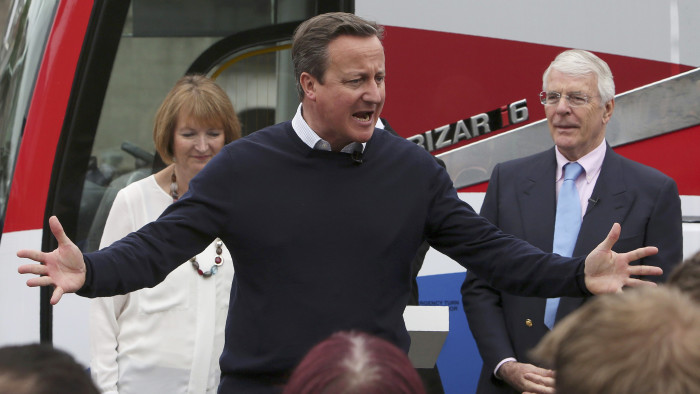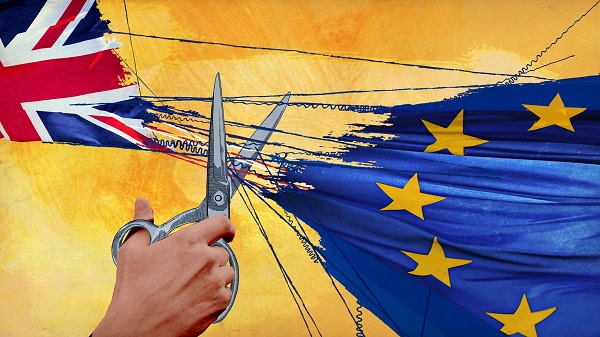‘Brits don’t quit’: Cameron’s final appeal on EU vote

David Cameron embarked on the last day of campaigning ahead of Thursday’s EU referendum in cautiously optimistic mood, making a final patriotic appeal for a Remain vote: “Brits don’t quit”.
Mr Cameron’s aides say polling indicators in recent days have moved in their direction, but admit that voter turnout could be crucial in determining Britain’s future role in Europe.
Meanwhile the tensions at the top of the Tory party were visible once again as Mr Cameron suggested that Michael Gove — one of his oldest friends in politics — had “lost it.”
In afternoon trading on Wednesday, London’s FTSE 100 was up 1 per cent and the pound added 0.4 per cent at $1.4704, holding on to recent gains made on signs of increased support for the Remain campaign.
Mr Cameron’s allies say surveys are picking up signs that voter turnout will be relatively high — thought to favour Remain — and that warnings about the economic risks of Brexit are resonating.
Opinion polls put the two sides neck-and-neck and the FT’s poll of polls has tightened to 44-44. Bookmakers William Hill make a Remain vote an 81 per cent chance.
Four more opinion polls will be published on Wednesday in a big test for an industry that came under heavy criticism last year for its failure to detect a shift in public opinion that led to a majority Conservative government.
Mr Cameron’s team believes that “silent Remainers” and a reversion to the status quo will deliver a victory for the pro-EU campaign, but only if it galvanises supporters to actually go out and vote.
The four-month campaign has exposed bitter splits at the highest level of the ruling Conservative party.
Wednesday saw Mr Cameron issue a withering put-down to Michael Gove, prompting speculation that his one-time ally could leave the cabinet if there is a Remain vote.
Mr Gove, justice secretary, had compared people warning of a Brexit recession to scientists paid by the Hitler government to come up with pre-ordained scientific results.
Mr Cameron told Sky News that his colleague was criticising expert economists, business leaders and institutions.
“To hear the Leave campaign today sort of comparing independent experts and economists to Nazi sympathisers — I think they have rather lost it,” he said.
On Wednesday there was a last-minute pitch to voters by senior political figures on both sides of the campaign.
Mr Cameron appeared alongside Sir John Major, the former Tory prime minister, and Harriet Harman, one-time Labour leader, at an event in Bristol.
Sir John said that Britain would be “seriously diminished” if it left the EU.
“I don’t want a Broken Britain without influence. And that is what we risk,” he said.
He rejected criticism that the Remain camp had turned into “Project Fear”, insisting instead that it had been “Project Reality”.
Mr Cameron said he “did not believe there were any risks from staying” in the EU and emphasised that a decision to leave the EU would be irreversible.
Boris Johnson, the figurehead of the Leave campaign, received huge applause at Wembley Arena in a BBC debate on Tuesday night when he declared that Thursday could be “independence day” for Britain.
On Wednesday, speaking at Billingsgate fish market in London — ahead of a bus tour of England — said a vote to leave would give Britain the freedom to pursue its own course.
The former London mayor dismissed forecasts suggesting the country would face an economic downturn if it quit the EU.
“This is a crucial time, lots of people will be making up their minds, and I hope very much they will believe in our country, believe in what we can do,” he said.
“It’s time to have a totally new relationship with our friends and partners across the Channel …it’s time to break away from the failing and dysfunctional EU system.”
While the official Vote Leave campaign has tried to sideline Nigel Farage, head of the UK Independence party, who gave his own speech in London.
Mr Farage said Ukip deserved all the political credit if Brexit occurred, saying the Tory-dominated official campaign had stolen his party’s policies and slogans developed over decades in the wilderness.
“I say with some pride, this would never have happened without Ukip. It is, in many ways, our referendum,” he said.
The Leave side believes that “differential turnout” — notably the fact that older voters tend to support Brexit and are more likely to vote — could help deliver victory.
Mr Cameron told the BBC’s Today programme on Wednesday that a Leave vote would be “irreversible”, adding: “You can’t jump out of the aeroplane and then clamber back into the cockpit.”
The prime minister also said he would press for further reforms to the EU’s free movement of workers rules if he wins the referendum, saying that “reform doesn’t stop on Friday”.
Although Mr Cameron failed to win bigger concessions on free movement during his EU renegotiation this year, popular concern across Europe about migrant movements and growing Euroscepticism across the bloc suggests the issue will not go away.
————————-
UK’s EU referendum: full coverage and analysis

View the FT’s comprehensive guide to the vote on whether Britain should stay in Europe, with all the latest news, analysis and commentary from both sides of the debate. See more
————————-
Comments